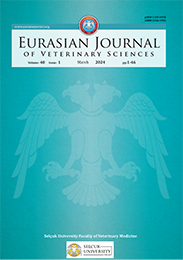| 2012, Cilt 28, Sayı 3, Sayfa(lar) 164-171 |
| [ Türkçe Özet ] [ PDF ] [ Benzer Makaleler ] |
| Heavy metal levels of drinking water in Bitlis province |
| Tahir Kahraman1, Süleyman Alemdar2, Mustafa Alişarlı3, Sema Ağaoğlu2 |
| 1Pendik Veteriner Kontrol Enstitüsü, Farmakoloji-Kalıntı İzleme Laboratuvarı, Pendik, İstanbul, Türkiye 2Yüzüncü Yıl Üniversitesi Veteriner Fakültesi, Besin Hijyeni ve Teknolojisi Anabilim Dalı, Kampüs, Van, Türkiye 3Ondokuz Mayıs Üniversitesi Veteriner Fakültesi, Besin Hijyeni ve Teknolojisi Anabilim Dalı, Kurupelit Kampüsü, Samsun, Türkiye |
| Keywords: Bitlis, drinking water, heavy metal |
| Downloaded:1651 - Viewed: 2394 |
|
Aim: This study was conducted to detect some heavy metal
levels of drinking water in Bitlis city.
Materials and Methods: A total of 164 water samples, collected from the tank and tap water of Bitlis and its provinces in autumn and spring were used as material. Element analysis (Fe, Mn, Cu, Zn, Cd, Ni, Pb and Co) was performed by flame atomic absorption spectrophotometer. Results: According to the results, the mean levels of Fe (6.67 μg/L), Mn (3.88 μg/L), Cu (7.52 μg/L), Zn (28.2 μg/L) and Cd (2.58 μg/L) were found to be in conformity with the drinking water standards. However, the mean levels of Pb (spring: 68.4 μg/L; autumn: 47.0 μg/L) and Co (spring: 44.2 μg/L; autumn: 11.9 μg/L) in both seasons, and Ni levels only in spring (40.1 μg/L) were higher than the related regulations. The effects of season on Fe, Zn, Cd, Ni, Pb and Co levels were found statistically significant (p<0.05). Conclusion: Considering the overall situation of the region and research findings, it is very important to the protection of existing water sources and routinely run water quality analysis, especially in drinking water in terms of public health. |
| [ Türkçe Özet ] [ PDF ] [ Benzer Makaleler ] |




